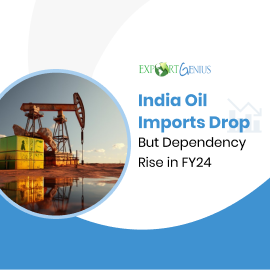Pulses Import in India – Pulses Import Data & Pulses Buyers in India
21 May 2018
India is the largest
producer, as well as traditionally the largest importer of pulses in the world
to ensure steady supply of the protein-rich diet to its citizens. Pulses, which
come under HS Code 0713, are annual
leguminous crops yielding between 1 and 12 grains or seeds of variable shape,
size and colour within a pod, which is used for both food and feed. Madhya
Pradesh, Maharashtra, Rajasthan, Uttar Pradesh and Karnataka are the largest
pulses growing states in India. As per Export Genius business intelligence
report on pulses import in India 2017, the country purchased pulses worth USD
2696 million in this year.
We give in-depth study of Indian import market of pulses by filtering every column in India pulses import data. It covers Date, HS Code, Product Description, Indian Importer of Pulses, Foreign Supplier of Pulses, Value, Quantity, Port, Foreign Country, etc. Apart from import data of pulses in India, the company provides import-export data of all classified products 60+ countries. They also provide analytical reports of 20+ countries based on product keywords such as brand, type, model, category, variety, etc.
Varieties of Pulses in India
Besides serving as an
important source of protein for a large portion of the global population,
pulses contribute to the healthy soils and climate change mitigation through
their nitrogen-fixing properties. Here are major pulses grown and consumed in
India:
·
Bengal Gram (Desi Chick Pea / Desi Chana)
·
Pigeon Peas (Arhar / Toor / Red Gram)
·
Green Beans (Moong Beans)
·
Chick Peas (Kabuli Chana)
·
Black Matpe (Urad / Mah / Black Gram)
·
Red Kidney Beans (Rajma)
·
Black Eyed Peas (Lobiya)
·
Lentils (Masoor)
·
White Peas (Matar)
The Government of India’s
National Agricultural Cooperative Marketing Federation of India (NAFED) and Small Farmers Agri
Consortium (SFAC) provides Minimum
Support Price (MSP) to the farmers for making sure that they get reasonable
price of their pulses.
Top 5 Countries Imported Pulses in 2017
Among countries of pulses
production worldwide, India is the largest producer pulses. It is also the top
importer of pulses, as it purchases pulses from other countries to meet
consumption of its citizens. During Jan-Dec 2017, India’s imports of pulses
valued at USD 2696 million, which shared 22.8% among world’s top importers of
pulses.
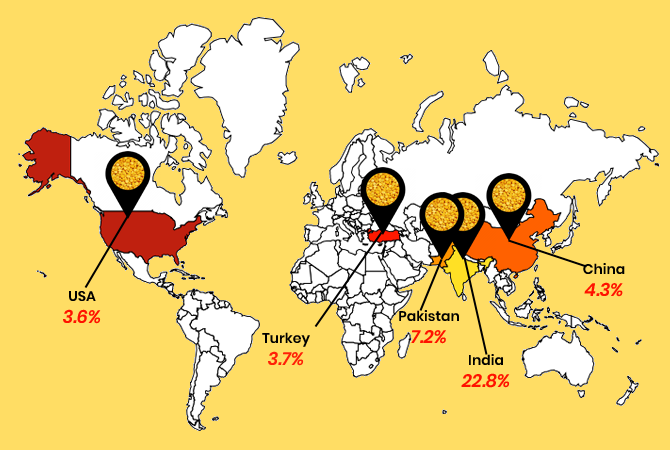
|
Country |
Value (USD %) |
Value (USD Million) |
|
India |
22.8 |
2696 |
|
Pakistan |
7.2 |
850 |
|
China |
4.3 |
506 |
|
Turkey |
3.7 |
439 |
|
USA |
3.6 |
427 |
Indian Import Market of Pulses
Recently, the government of
India has tightened norms for the import of pulses in order to make sure that
its domestic prices don’t fall below the minimum support price. According to a
notification of the Directorate General of Foreign Trade (DGFT), the government has also introduced a quota system only for
millers and refiners for the import of urad, moong and tur pulses. To avail
this quota, dal millers have to submit their applications between 15 and 25 May
2018. It also said that the allocation of quota for each beneficiary will be
notified on June 1 and millers have to complete their imports by August 31. This
policy will benefit Indian farmers as the import quota has been reduced this
year compared to the previous year.
Importers
of pulses in India imported tur pulse as it was much cheaper in
the global market compared to the domestic market. More than 4.04 lakh tonnes
of tur pulse were purchased during April-November 2017 as against the cap of 2
lakh tonnes imposed by the government for financial year 2017-18. In order to
check imports of pulses in India, the government has asked dal millers to
inform them of their imports of pulses on a weekly basis. Recently, it has
imposed import cap on split and milled dal as well. It has also fixed the
quantity of 1.5 lakh tonnes each of urad and moong dal along with 2 lakh tonnes
of tur dal.
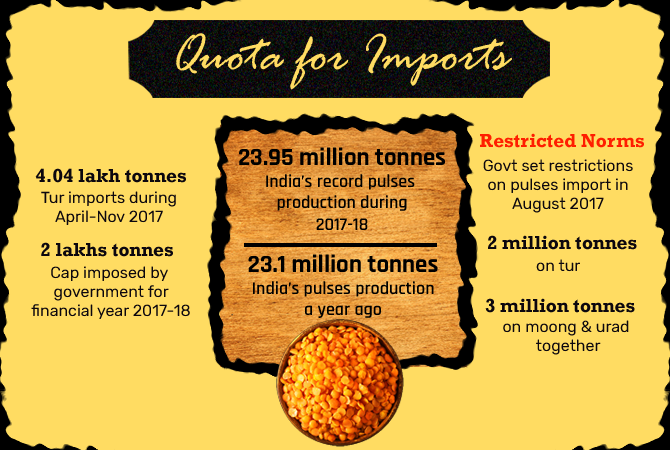
India Imports of Pulses in Last 5 Years
According to Indian
government data, India has purchased 50.8 lakh tonnes of pulses for INR 17,280
crore during April-December 2017. India imports pulses to meet the gap between
domestic production and demand. From 2013 to 2016, imports of pulses in India
increased, however, figures declined tremendously in 2017. Here is a look at
India imports of pulses in last 5 years.
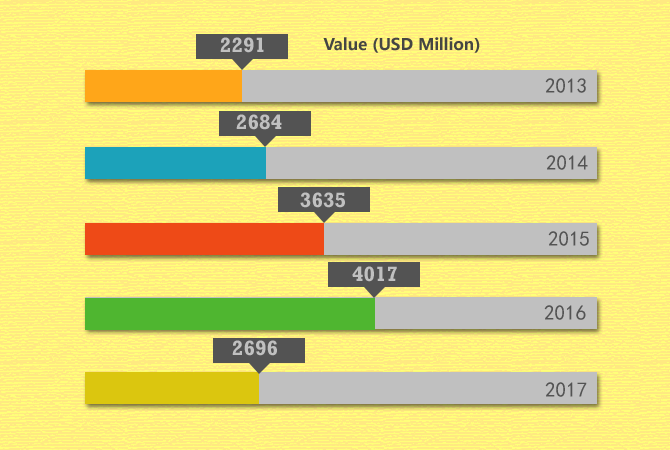
|
Year |
Value (USD Million) |
|
2013 |
2291 |
|
2014 |
2684 |
|
2015 |
3635 |
|
2016 |
4017 |
|
2017 |
2696 |
India Imports of Pulses from Top 5 Countries in 2017
India import pulses from
which country the most? India purchases pulses the most from Australia in 2017,
followed by Canada, Myanmar, Russia and Ukraine. Imports of pulses from
Australia valued at USD 836 million, which shared 31% in world’s total imports
of pulses in India. Here are 5 largest countries that supplied pulses to India
during Jan-Dec 2017.
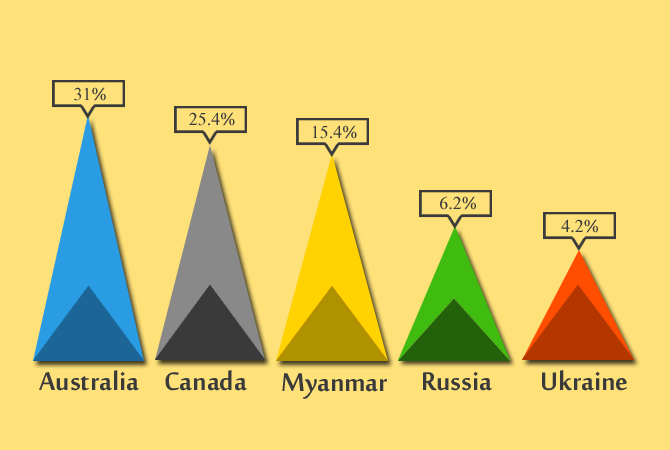
|
Country |
Value (USD %) |
Value (USD Million) |
|
Australia |
31 |
836 |
|
Canada |
25.4 |
683 |
|
Myanmar |
15.4 |
414 |
|
Russia |
6.2 |
168 |
|
Ukraine |
4.2 |
112 |
Members of the World Trade
Organization (WTO) including the US,
Japan, European Union, Australia and Canada have raised concern over India’s
quantitative restrictions on import of pulses. This issue came up in 20th
April 2018 meeting of the committee on import licensing at the WTO with
countries alleging that quantitative restrictions by India on import of pulses
distort global prices and put the future of farmers across many countries in
peril.
About India Pulses and Grains Association (IPGA)
India Pulses and Grains
Association (IPGA) is the apex body of India’s pulses and grains industry and
trade. Based in Mumbai, it is registered under Section 8 of the Companies Act
2013 with more than 270 members including various regional associations of the
pulses industry. The association has plans to reach over 10,000 stakeholders in
India involved in the farming, processing, warehousing and import business of
pulses across the entire value chain. Since 2011, IPGA has been in discussion
with the Agriculture as well as the Consumer Affairs Ministries for making the
following amendments in the policies:
·
Including Pulses in the Food Security Act.
·
Including Pulses in the Public Distribution
System.
·
Allowing free exports of all pulses.
·
Removal of stock limit on domestic produce.
· Ensuring that pulses are traded at the MSP.
In case there is any drop of the trading price, Government Agencies like NAFED need
to step in and buy the produce at the MSP.
IPGA works closely with
governments at various levels including Central Government, State Government
and other authorities to assist in evolving dynamic policies to boost pulses
industry.
So, our market research
report on India’s imports of pulses help Indian buyers of pulses to know their
competitive level & find foreign suppliers of pulses. It also helps foreign
exporters to find genuine Indian buyers of pulses. Furthermore, banks,
logistics companies and market research agencies can also use our analytical
report for various purposes. If anyone wants to buy this report, just check out
the sample given below to know which data fields are covered in India import
data of pulses.
|
Date |
01-11-2017 |
|
HS Code |
07131000 |
|
Product Description |
Yellow
Peas |
|
Quantity |
91.673 |
|
Unit |
MTS |
|
Unit Price (USD) |
394.999945 |
|
Foreign Country |
United
States |
|
Indian Importer Name with Contact Details,
Foreign Supplier Name with Contact Details, Port, etc. |
***Available
on Purchase Only |
Remember Export Genius is a leading market
research agency, providing 100% authentic international import-export data of
more than 60 countries and all classified products.
To buy our market research report and
data, e-mail us at [email protected].
For any media related enquiries, please contact us at [email protected].



